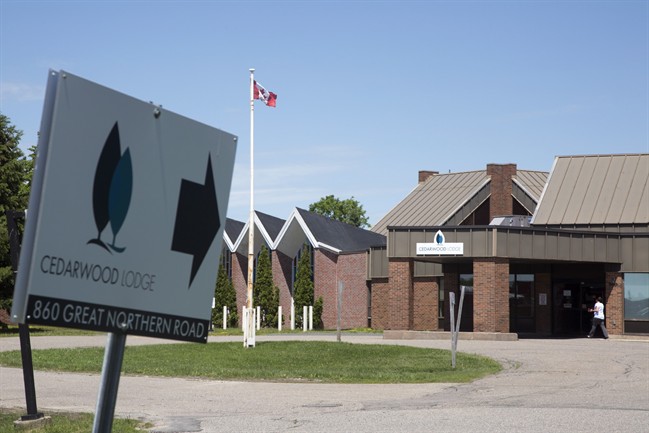An incontinent man with Alzheimer’s repeatedly left in soiled clothes. A head injury not reported to the patient’s family. Seniors held in an old, deteriorating building with no sprinklers.

The allegations of neglect and substandard care are contained in letters the families of five patients at a nursing home in Sault Ste. Marie, Ont., sent to Health Minister Eric Hoskins earlier this month.
The nursing home — Cedarwood Lodge — was opened in 2015 to ease overcrowding at the local hospital by providing temporary stays for alternative-level-of-care patients — those taking up hospital beds because they can’t live independently and don’t yet have permanent care arrangements.
READ MORE: Census 2016: Elderly women redefining what it means to age alone
Patients were meant to stay at the facility temporarily before being transferred to long-term-care homes, but two years later more than half who moved to the home when it opened remain there today.
“Nothing is being done to move the current residents to a proper care facility,” said one of the letters from the families, who didn’t provide their names, citing fear of backlash from staff.
“Until all of the residents are moved to a proper long-term health-care facility their lives are at risk.”
Officials at Cedarwood and its owner — Autumnwood Mature Lifestyle Communities — refused to be interviewed, but said in a statement that the home’s “shortcomings were unacceptable and beneath the bar Cedarwood Lodge sets for itself.”
The Ministry of Health has acknowledged that problems at Cedarwood pose a serious risk to residents and, after its inspectors documented multiple alleged cases of abuse in their reports on the home, ordered the facility on March 28 to stop taking in new residents.
Since then, only one resident has been transferred out — two have died and 47 remain there, on wait lists for long-term care homes.
READ MORE: Canada ‘woefully unprepared’ to deal with senior population surge, Senate committee hears
The problems at Cedarwood come as the Ontario government struggles to find solutions to the escalating problem of hospital overcrowding. One of those solutions, according to the government, would be moving alternative-level-of-care patients out of the hospitals. They make up 15.5 per cent of patients in the province’s hospitals, according to the Ontario Hospital Association.
The long-term care sector has been urging the government to fund 2,500 to 5,000 new beds — at an operating cost of $52,000 each a year — to meet growing demand. But there was no new funding in the spring provincial budget for additional beds.
Instead, $24 million dollars was earmarked for “innovative” ways of dealing with alternative-level-of-care patients, including more interim beds for patients waiting for long-term care.
READ MORE: Census 2016: For the 1st time, more seniors than children living in Canada
Hoskins said the province is working on expanding long-term care, but interim-bed solutions, which he stressed need to be “safe and supportive,” are used when it’s the right solution for a community.
“It is generally the result of a unique situation faced by that community where it’s felt that issuing those interim licenses would be an appropriate response,” he said.
Hoskins said the interim nature of Cedarwood is not to blame for its problems, adding that the province is working to improve the facility. He said the home’s owners were ordered last month to institute new management at their own expense.
“It’s the top priority, not just to improve the safety, but the comfort and the requisite support for individuals who reside there,” he said.
Advocates, however, point to the problems at Cedarwood as an example of what can go wrong with interim care when there’s a shortage of long-term-care homes.
Cedarwood, which was opened in a former nursing home that had sat vacant for two years after a previous operator moved to a more modern building, was given a temporary, five-year license in 2015 with a mandate to operate solely interim beds.
But the nine long-term-care homes in Sault Ste. Marie can only accommodate 24 new patients a month on average, and as of April, there were 655 people waiting for a spot, according to the local Community Care Access Centre.
READ MORE: Elderly bullying happens in Saskatoon, study
That means Cedarwood’s patients have no idea when they’ll be able to move out of the facility, which, according to government inspection reports, has repeatedly been understaffed, failed to meet residents’ toilet and bathing needs, and has failed to provide proper care of wounds, pressure ulcers and bed sores at times.
The reports also allege incidents of patient-on-patient abuse.
One report alleges a resident sexually abused two others on multiple occasions. Staff were aware but didn’t report the alleged abuse to the Ministry of Health or the residents’ legal decision-makers as required, nor did they allegedly prevent it from continuing.
READ MORE: 71-year-old man dead after fire at Brampton seniors home
The same report also documents a case of physical abuse in which one resident injured another, and says the home failed to follow up on a plan to stop the aggressor’s behaviour from reoccurring.
France Gelinas, an NDP member of the provincial legislature, has been trying to help families of those who live at Cedarwood.
The government awarded the home’s license to a company with no previous experience in long-term care and decided to set up the facility in a building in poor physical condition, she said in a recent interview.
“An interim facility means you do not have the criteria to operate long-term care, and we give you a license to operate anyway,” said Gelinas.
“Can nobody see this is set up to fail?”



Comments